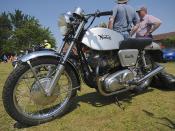Invisible Man Research Paper Imagine a senior student out of Poverty-stricken lifestyle arriving on a major university's campus. His eyes are big; his stomach full of butterflies and all he can think of is fitting in. Once he does so, his mind races and he gets a sort of will to succeed. Now imagine the extremes he will go, to succeed. Will he cheat on tests? Will he suck up to the dean of students? Or, will he go as far as murder? In either of the cases the "first half of Invisible Man is a tour de force sequence which sees the narrator, before his faith is finally staked"� (Singleton 13). The critics' opinions of characterization, setting, and tone in Ralph Ellison's Invisible Man differ.
Singleton believes the value and use of the narrator is based solely on Booker T. Washington. The most mentioned black leader in Invisible Man is Booker T. Washington (Singleton 11).
Washington was a great leader who stood up for what he believed. The unnamed hero of Ellison's narrative is, during his pre-invincibility states of growth, essentially a public speaker, and it is as a public speaker that he becomes implicated in the idiom of Booker T. Washington (Singleton 11). The hero is both Washington and the narrator because of the similarities they have. It is easily seen that "the hero's progress from non-age to philosophical independence is mirrored in his public Thompson 2 utterances"� (Singleton 12). These utterances are essentially what makes the narrator stand out alone from others in Harlem. Without being "an orator, a rabble rouser"� or any other loudmouth coin pincher who paves his own roads (Singleton 12). Singleton is correct in his views of the valve of the narrator and the great Booker T. Washington.
Anthony West views...

![[Portrait of Abe Most, Pete Ponti, Sid Jacobs, and Jimmy Norton, Hickory House, New York, N.Y., ca. June 1947] (LOC)](https://s.writework.com/uploads/9/94582/portrait-abe-most-pete-ponti-sid-jacobs-and-jimmy-norton-hi-thumb.jpg)
